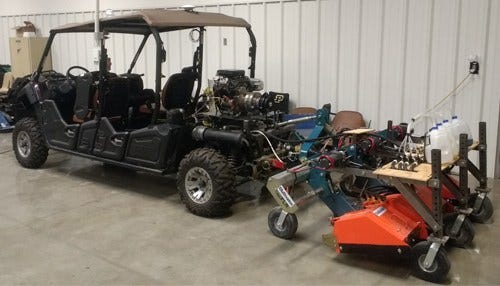agBOT Challenge Highlights Need to ‘Plug In’
 Purdue's agBOT is designed to chemically or mechanically eradicate weeds.
Purdue's agBOT is designed to chemically or mechanically eradicate weeds.
Subscriber Benefit
As a subscriber you can listen to articles at work, in the car, or while you work out. Subscribe Now“Shark Tank” for agriculture is how an Indiana farmer describes the robotics competition he created, which is attracting teams from as far away as Canada to duke it out in a Hoosier cornfield next month for $100,000 in prize money. Gerrish Farms says the goal of the agBOT Challenge is three-fold: to inspire young minds to tackle modern-day problems on the farm, introduce investors to new technologies and demonstrate how robotics can revolutionize the ag community. There’s just one problem: high-speed Internet access.
Gerrish Farms is in the small town of Rockville, with a population of about 2,600, and—like many rural areas—lacks high-speed Internet access. Robotics rely on broadband connectivity to analyze information, store data and function autonomously. Gerrish Farms Owner and Manager Steve Gerrish says even everyday machinery farmers now use is equipped with advanced software that requires broadband.
“We were looking for a way to demonstrate what could be achieved on the farm if you did have ultra-high speed communication capability with the equipment,” says Gerrish. “[agBOT] shows if you had unlimited broadband access, what you could do with drones, robotics and artificial intelligence on the farm.”
The June event marks the second year for the three-year agBOT Challenge series, and the farm is fully wired. Gerrish worked with AT&T to install fiber at the farm and also launched his own company called airBridge, which provides “last mile” broadband delivery for rural ag operations. airBridge is also the ag licensee for Indianapolis-based Broadband Antenna Tracking Systems (BATS), which provides mobile broadband wireless networks over long distances—think battlefields, cruise ships—or rural farms.
It’s a permanent installation at Gerrish Farms, but Gerrish says neighboring farms and residents are still hungry for broadband connectivity. The small town could benefit from the experienced entrepreneur’s new businesses; Gerrish helped launch 17 startups in his former role as director of business development at the Purdue Research Foundation.
“Autonomous machine-learning for planting, tending and harvesting the crops, the advances in artificial intelligence—bringing that intellect to your decision-making on the farm is enormous,” says Gerrish. “Anybody that has a cell phone…realizes having that at your fingertips for every single problem on your farm could be extremely powerful—not just for the farmer to make a living, but for the consumer for food traceability and food safety. There are all types of really cool implications.”
It will be university and entrepreneurial teams from throughout the country—and a few from Canada—demonstrating the power of ag robotics at the competition; Indiana teams include Purdue University and IUPUI.
The 2017 agBOT Challenge includes the Seeding Competition, in which the unmanned robots must plant at least two 1,000-foot rows of corn while changing seed variety, weighing and applying fertilizer and streaming live video. New for the 2017 event is the Weed & Feed Competition; robots will identify three common weeds among the corn and kill them chemically or remove them mechanically.
The Purdue team will compete in the Weed & Feed event; its robot uses software to process images in the field. The recent agricultural and biological engineering and mechanical engineering graduates have trained the software to recognize weeds amongst the corn.
“There comes a point where a human can only do something so efficiently, whereas a machine can repeat and do things more efficiently,” says Ryan Romanowski, a Purdue agBOT team member. “It’s a big focus [in agriculture] to try to reduce erosion, increase yield and utilize less resources while maximizing other areas. Robotics allow that to happen.”
As a fourth-generation family farm, Gerrish Farms is hopeful the agBOT Challenge will plant the seeds of innovation in Rockville to help it—and other rural farms—flourish in the future.
“It’s so thrilling to see how these creative young minds are coming in and solving some of these problems. I think anybody that comes to [agBOT] is going to say, ‘Wow, I never thought we could do that.’ I’m as surprised as everybody else; it’s fascinating,” says Gerrish. “Having these young people engaged in finding solutions in farming and embracing ag is really exciting.”
Romanowski says the Purdue team will compete in the Weed & Feed Competition, which challenges teams to mechanically or chemically remove weeds.
In addition to exposing new technologies, Gerrish says the competition is beneficial for the farm’s business operations.
Gerrish says the agBOT Challenge helps farmers take a leadership role in the push for connectivity in rural areas.
